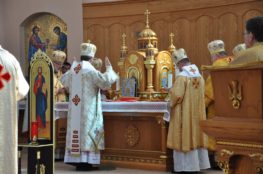Perhaps it’s just a coincidence, but I couldn’t help but notice that First Things posted a critical (some might say damning) analysis of Russian church/state mingling on the anniversary of Our Lady of Fatima’s Miracle of the Sun. Sergei Chapnin’s “A Church of Empire” will be a sobering read for those who believe “Holy Russia” has returned under the gaze of President Vlaidmir Putin and Moscow Patriarch Kirill. Chapnin, an Orthodox believer himself, does not buy the line that a great moral awakening is ongoing in Russia. Rather, the Orthodox Church has become “a post-Soviet civil religion providing ideological support for the Russian state.” It’s difficult to argue with that conclusion in light of both the Moscow Patriarchate’s “Russian World” rhetoric and the dreadful number of abortions and divorces which occur in the country each year. None of this is to say that all is lost, however. Even if the Russian Church lacks living links to its pre-Soviet past, the Russian Orthodox tradition itself holds the seeds for authentic spiritual, moral, and social renewal. The question now is when the upper hierarchy in the Russian Orthodox Church will have the fortitude to truly resist secular political influences on ecclesiastical life. Some are hoping it will come during this generation, but given current circumstances, it may still be a long ways off.
Over at the site One Peter Five, a gent going by the alias Benedict Constable has some sobering words for Catholics. “Getting Real About Catholic History: A Brief Review of Papal Lapses” dumps a bucket of ice water on ultramontane sentiments by reviewing some fairly infamous moments in Church history where popes scandalized the faithful and, arguably, undermined the Catholic Faith. Perhaps it is too early to tell for sure, but there seems to be a slow — but steady — drift away from papal maximalism within certain circles of the Catholic Church, a drift that undoubtedly bodes well for the future as far as both preserving the Faith and improving relations with the Eastern Orthodox are concerned. It is interesting to see that while Pope Francis has done next-to-nothing to curb open dissent against Church doctrine during the ongoing Synod on the Family, several Greek Catholic leaders, including Patriarch Sviatoslav of the Ukrainian Greek Catholic Church (UGCC), have stood firm for the Apostolic Faith. The successor to St. Peter is not the only one available to shepherd the faithful in these troubling times.
Speaking of the UGCC, I made a brief mention yesterday of an academic article by Fr. Peter Galadza where, inter alia, he examines four 17th C. Kievan Liturgicons (roughly equivalent to a Missal for Latin Catholics), including the first printed 1617 edition which was edited in part by St. Josaphat Kuntsevych, the polarizing promoter of Orthodox reunion with Rome. This foundational liturgical text for the Greek Catholics, which was printed just 21 years after the Union of Brest, includes neither the filioque in the Creed nor a commemoration for the pope. Following proper Byzantine liturgical praxis, such a commemoration would have been reserved to the metropolitan bishop rather than parish priests. Today, regrettably, the pope is given primary commemoration during the litanies despite the fact that he is not the primate of the UGCC. The practice has no support in Byzantine liturgical history and will hopefully be eliminated in due course.




October 13, 2015
Among anti-maximalists I think Pope Francis might be first among equals. With no value judgement implied I have come to see him as the Barack Obama of the Catholic Church. Greeted with equal (and I say equally unfounded) hysteria by both right and left he disappoints both by failing to really do much at all. He builds incredible popularity through personal charisma, bold gestures and edifying statements, but when it comes to business he seems to lead from behind, letting the factions work it out.
October 13, 2015
In light of ISIS’ (or IS’, or Daesh’, or whatever) depredations in the Middle East, as well as their persecutions and extinctions of Christians in that same region, I for one am thankful that Russia’s Putin and the Patriarch of Moscow are united in their opposition to ISIS. Would that there were a similar union between RC clergy and the leaders of the EU or the US on the same subject. In this instance, what’s a little Caesaro-Papism among friends?
On a somewhat more serious note, however, it seems that more than a few RCs appear unclear on the concept of their relationship with the Bishop of Rome. From all that I have read on the subject, we are supposed to have an attitude of willing reception of what that august person has to say. I have found that task not too difficult, when I bother to turn from what the chattering classes are saying about His Holiness, and instead listen to what His Holiness has to say for himself. I find that the latter has always been more wholesome, as well as far more interesting.
As regards Ultramontanism, I find it as boring as the accounts in Brideshead Revisited of that poor little tyke, Rex Mottram. Thus, I must thank you for passing to me that brilliant essay of Elliot Milco regarding the abovementioned subjects.
October 13, 2015
I certainly don’t take the position that all is rotten in Russia (or even among the MP). The depressing thing is that I have a lot of admiration for Russian Orthodoxy; its history; its spirituality; and the faithful witness for Christ many of its bishops, priests, and faithful showed during the Soviet Revolution and its bloodier aftermath. What saddens me is how the MP is compromising its moral authority by pandering too much to the state, and I don’t think that will yield positive returns for the Russian Church in the coming decades. And as you know, I remain less-than-thrilled with the MP’s attitude toward the UGCC and its imperialist posture toward Ukraine as a whole. I know it’s a messy situation, but at some point you have to cry foul.
October 13, 2015
Gabriel, I agree completely with this summation of the issues. It would appear that once again, the true Church of the Russian people, might be the Old Believers, who refuse to get drawn into the symposium of church and state.
October 13, 2015
This all makes the Zoghby Initiative seem very appealing. I am just a frequent visitor at the local Greek Catholic (Ruthenian) church here in Houston, but, in addition to the truly immemorial liturgy, which is truly a taste of heaven, there is generally the sense that one can get back to spiritual and patristic basics without having to deal with the subtext of the intra-Latin fighting.